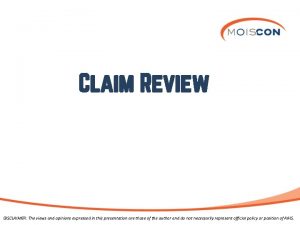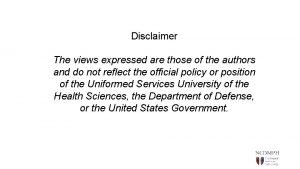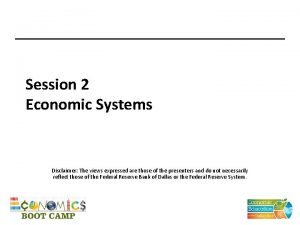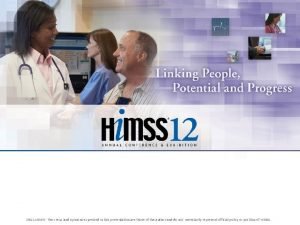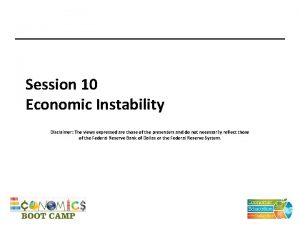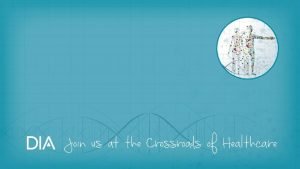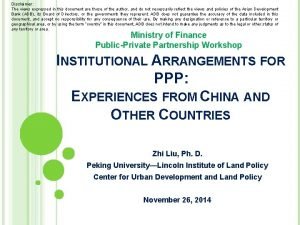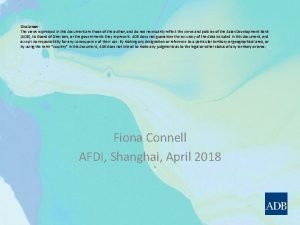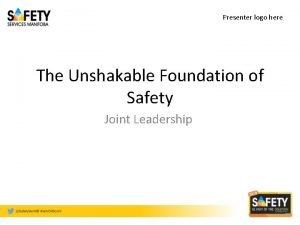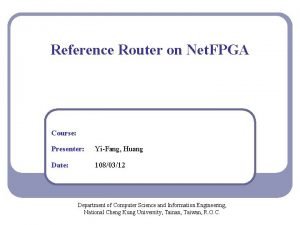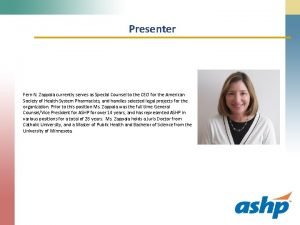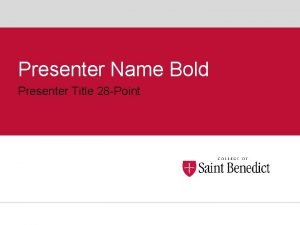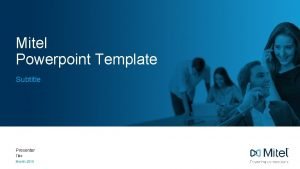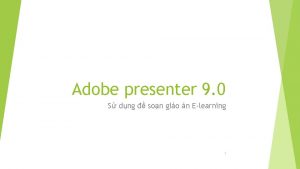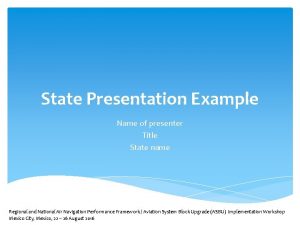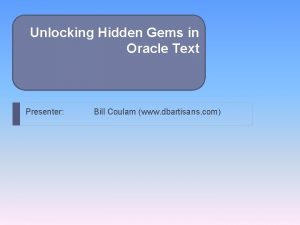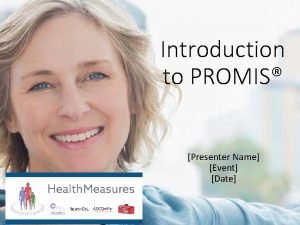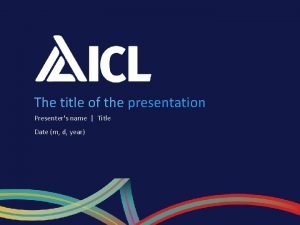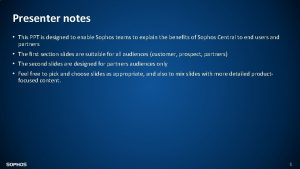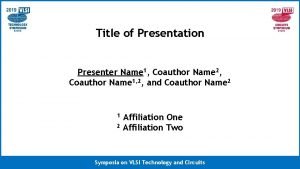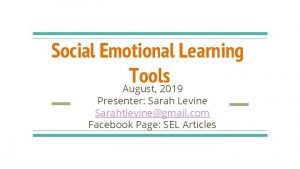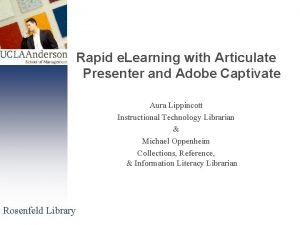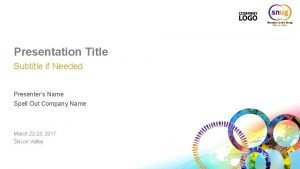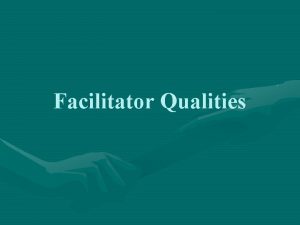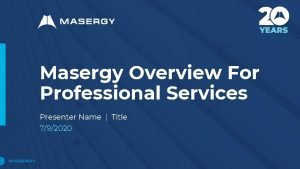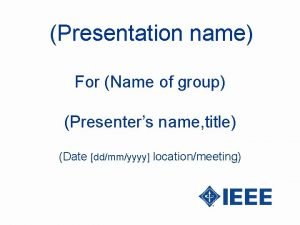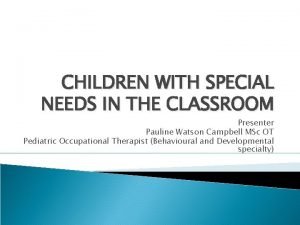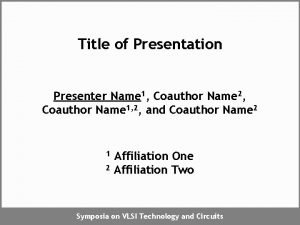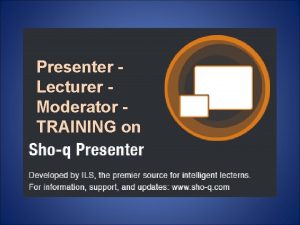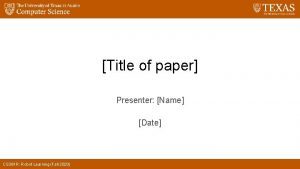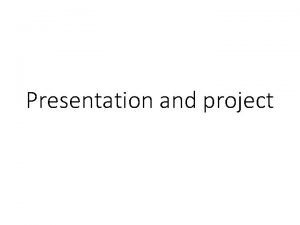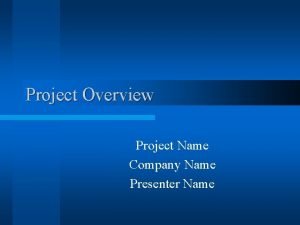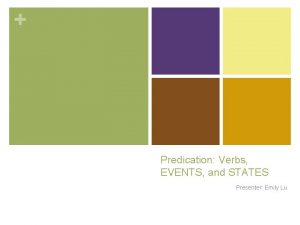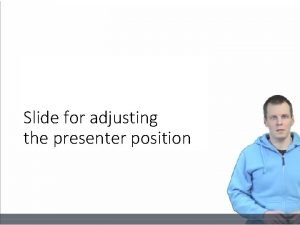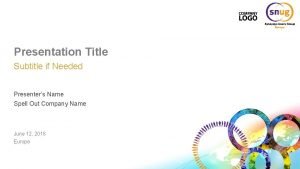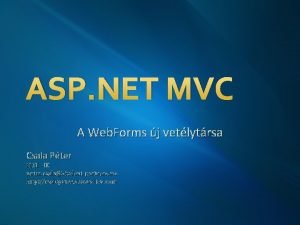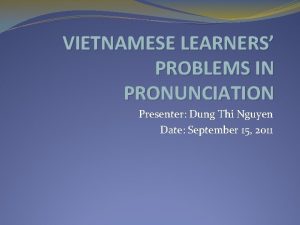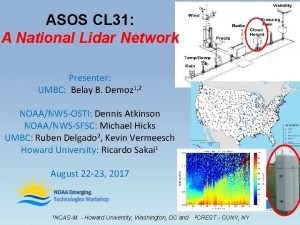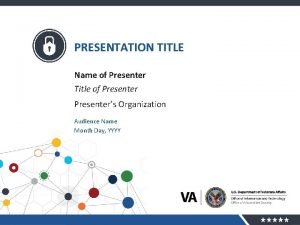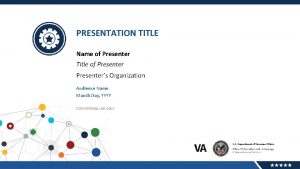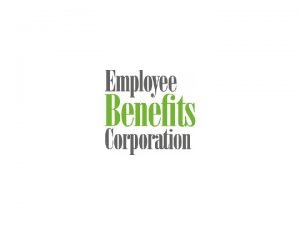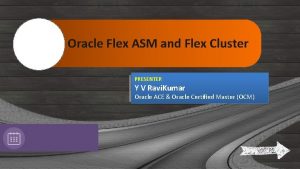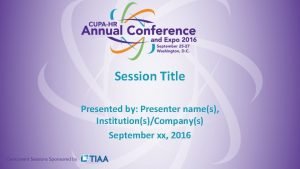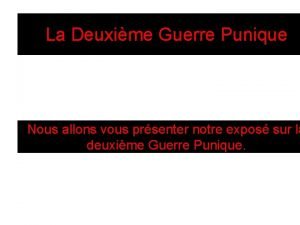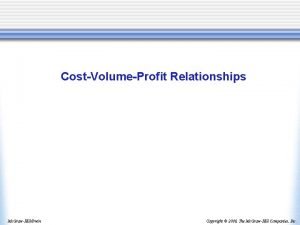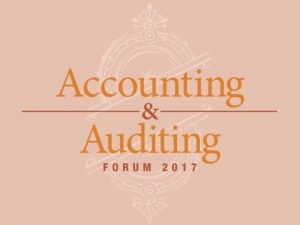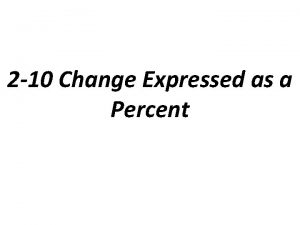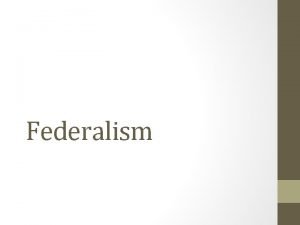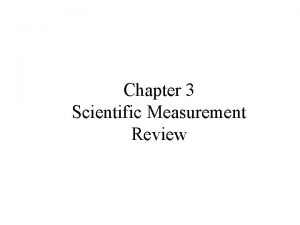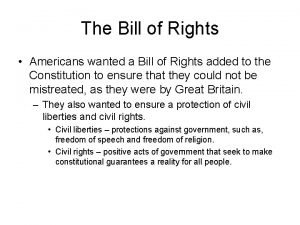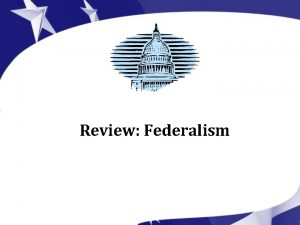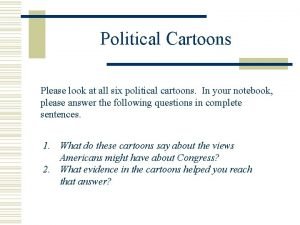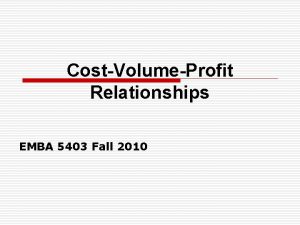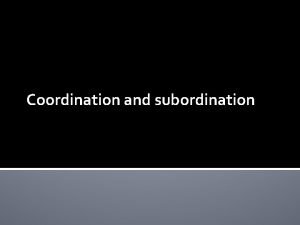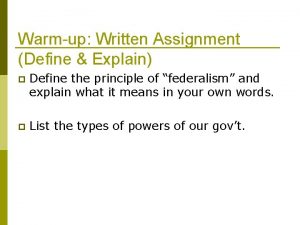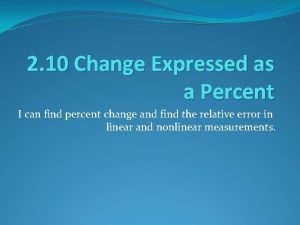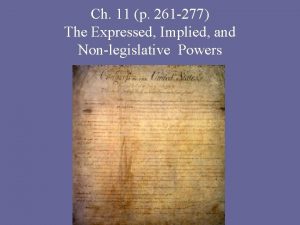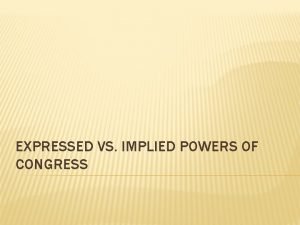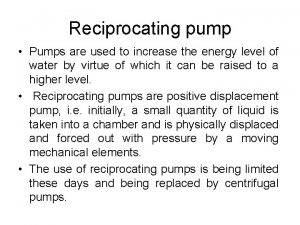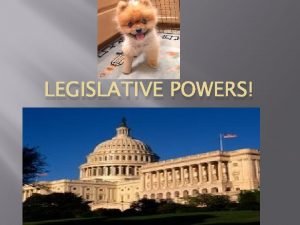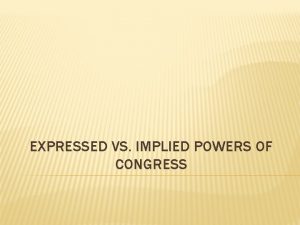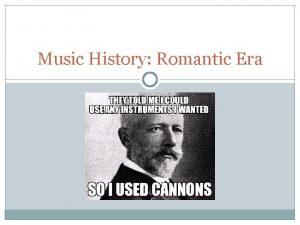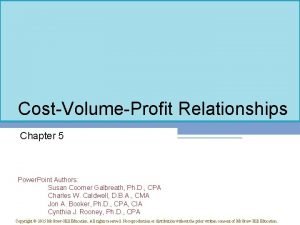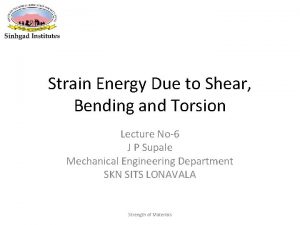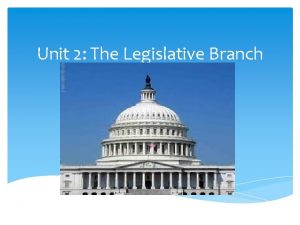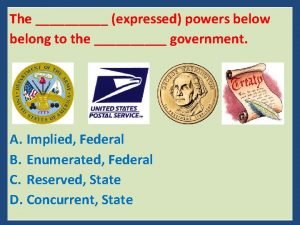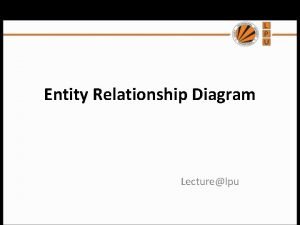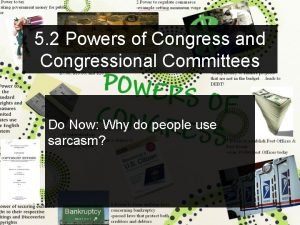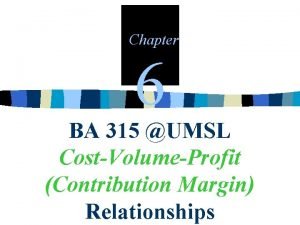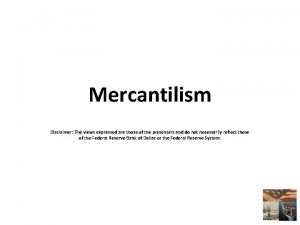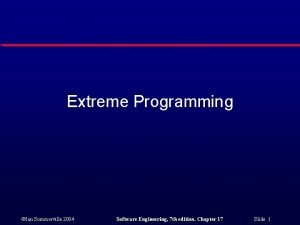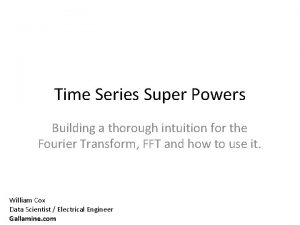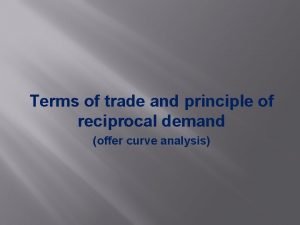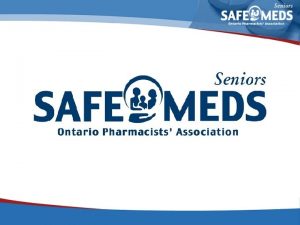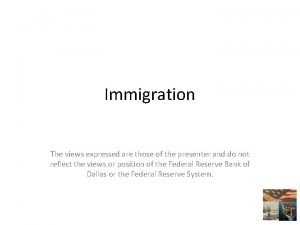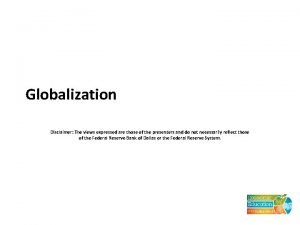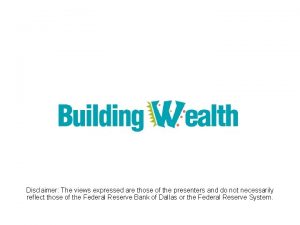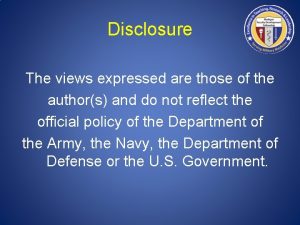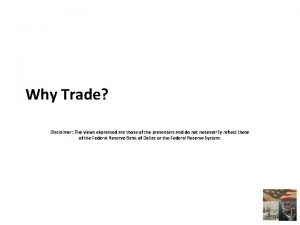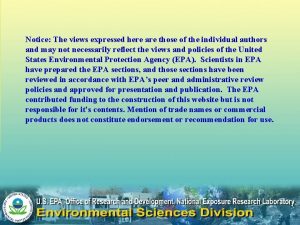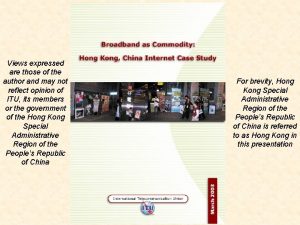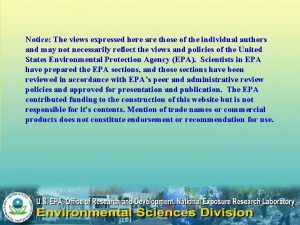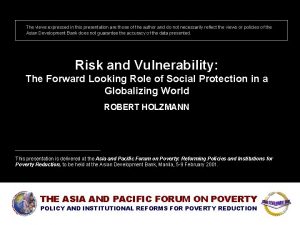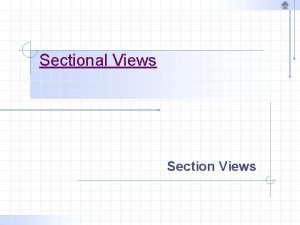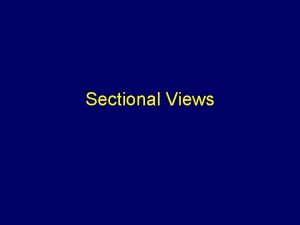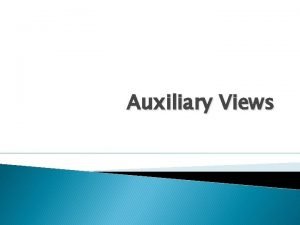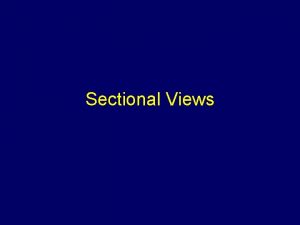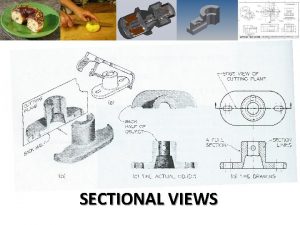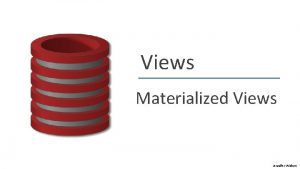The views expressed are those of the presenter






















































































































































- Slides: 150


The views expressed are those of the presenter and, therefore, do not necessarily represent the views of either the Council or any Committee(s)/Board(s) of the Council of the Institute of Chartered Accountants of India (ICAI). • • The slide deck should be understood in context of the speaker presentation E&OE IMA - CFO FORUM 4/13/18 3

§ “Throughout the world, there is a great awareness among citizens in general that every learned profession should develop a sense of social purpose and social obligation and this should be more so in the case of the accounting profession, which because of the present context in the country has assumed considerable importance. § The Chartered Accountant is a person on whom every member of the society could rely and rely strongly. His certificate would be one by way of a seal and a hall mark of which would inspire confidence in the minds of all concerned as certificates by a person fully competent and holding a charter from the Supreme Legislature of the country for the purpose. ” 4

1. NFRA EVOLUTION 6. NFRA - Composition 2. GOI Press release 7. NFRA – WIP 3. Misconceptions 8. DC @ ICAI 4. NFRA – International 9. Impact to Accounting scenario 5. NFRA- ICAI Impact ? IMA - CFO FORUM Profession 10. Regulation 4/13/18 5

§ Upto 1998 : AS mandatory only on CAs § 1998 Companies Act Amendment § AS mandatory on corporates/ preparers § NACAS recommendatory body to Govt § 2001 onwards § Enron / SOX § All countries develop similar mechanism – extension of capital market regulator § 2011 Companies Bill - Public exposed § NACA&AS IMA - CFO FORUM 4/13/18 6

§ 2011 tabled at parliament § NFRA introduced ( instead of NACA&AS) § ICAI representation since 2011 § Section 132 was not convincing to many parliamentarians § ICAI has approached Govt in 2010 for power to regulate firms IMA - CFO FORUM 4/13/18 7

Impact of NFRA: § The decision is expected to result in improved foreign/domestic investments, enhancement of economic growth, supporting the globalisation of business by meeting international practices, and assist in further development of audit profession. IMA - CFO FORUM 4/13/18 8

Listed Unlisted • Paid up capital – 1 Kcr • Turnover – 1 Kcr • Borrowing – 0. 5 Kcr Jurisdiction of NFRA: § The jurisdiction of NFRA for investigation of Chartered Accountants and their firms under section 132 of the Act would extend to listed companies and large unlisted public companies, the thresholds for which shall be prescribed in the Rules. The Central Government can also refer such other entities for investigation where public interest would be involved. § The inherent regulatory role of ICAI as provided for in the Chartered Accountants Act, 1949 shall continue in respect of its members in general and specifically with respect to audits pertaining to private limited companies, and public unlisted companies below the threshold limit to be notified in the rules. § The Quality Review Board (QRB) will also continue quality audit in respect of private limited companies, public unlisted companies below prescribed threshold and also with respect to audit of those companies that may be delegated to QRB by NFRA. Further, ICAI shall continue to play its advisory role with respect to accounting and auditing standards and policies by making its recommendations to NFRA. IMA - CFO FORUM 4/13/18 9

§ Background for NFRA: The need for establishing NFRA has arisen on account of the need felt across various jurisdictions in the world, in the wake of accounting scams, to establish independent regulators, independent from those it regulates, for enforcement of auditing standards and ensuring the quality of audits to strengthen the independence of audit firms, quality of audits and, therefore, enhance investor and public confidence in financial disclosures of companies. IMA - CFO FORUM 4/13/18 10

1. Education institution 2. Education + Standard setter + Oversight+ Discipline 3. Self-regulated 4. Pace of disciplinary cases 5. Extent of punishment IMA - CFO FORUM ICAI as per Act is a Regulator of Accounting profession: • Eligibility to become accountant (charter) is through exam (practical training and conceptual knowledge): ICAI education support is to only ensure good quality, well trained accountants are there for country • License ( membership) • Code of Ethics • AS. SA, GN and TG • Qo. S ; CPE and review through PRB, FRRB and QRB • DC : punish errant on inspection of quality ( PRB, FRRB & QRB ) 4/13/18 11

§ Governed by the Central Council comprising 40 representatives with a three year term. § 8 Members on Council are nominated by government. § 4 Standing Committees : Executive, Finance, Examination and Disciplinary § Finance Committee : 2 Govt. Nominees out of 5 members § Executive and Examination : 1 Govt. Nominee out of 5 members § Non-Standing Committee : 1 Govt. Nominee in each of the Non-Standing Committees

Particulars Total Government Nominees Accounting Standards Board 27 3 Auditing and Assurance Standards Board 21 2 Committee on Accounting Standards for Local Bodies 20 2 Ethical Standards Board 12 2 Valuation Standards Board 11 1 STANDARD SETTERS BOARD Standards Setters boards also have representatives from C&AG, SEBI, RBI, Chambers, CBDT, ICSI, CBEC, CII, FICCI, ASSOCHAM etc. DISCIPLINARY* Board of Discipline (2 benches) 3 (in each bench) 1 (in each bench) Disciplinary Committee (3 benches) 5 (in each bench) 2 IAS (Retd) & ex-Secretary Govt. of India, 1 ex-CBDT Chairman, 3 IRS (Retd. ) Officers, 1 NACAS Chairman) *In both Board of Discipline and Disciplinary Committee decisions are taken on consensual basis. In none of the decision any dissenting view is noted from any government nominee.

§ ICAI Continues to represent § Inappropriate understanding of oversight; India not comparable with other countries; all countries have reason to emulate India § Accounting Body : Single vs Multiple § Accounting Body: Under statute vs NPOs/ Association § PCAOB/FRC – extension of capital market regulator § FRC has oversight on professions like actuary and also has focus on corporate governance § PCAOB/Focus is essential inspection; not investigation § ICAI – only regulation, similar to SEBI/RBI ( Eligibility is exam and training), then regulate IMA - CFO FORUM 4/13/18 14

Summary of Financials Total Revenue Total Expenses Staff Strength US PCAOB (2016 AR) US$ INR Equiv 254. 7 Mn 1, 655 crore 249. 7 Mn 1, 623 crore 876(Budget 2017) UK FRC (Mar 2017 AR) GBP INR Equiv 31. 75 Mn 286 crore 29. 27 Mn 263 crore 158 ICAI : unique model of members funding; members offering time for oversight ( PRB, FRRB, QRB), members offering time to run an establishment of 3 lac members, a million students, 162 branches, 32 overseas chapters ( nearly 1000 members giving near full time probono); lower cost of education to students, lower cost of membership, no external funding of public money, instead crowd sourced from members, etc 4/13/18 15

§ ICAI Regulatory powers – No Impact 1. Section 133 - ONLY ICAI will prepare AS and SA 2. ICAI prepared AS and SA will get notified under Companies Act ( with NFRA recommendation) 3. If any DC case ( listed and large unlisted) is taken up by NFRA, then such case will not be pursued by any regulator ( ICAI, SEBI, RBI, IRDA, etc) § NFRA Role 1. Examine and recommend AS and SA prepared by ICAI 2. Oversee Qo. S of Profession ( Qo. S of members will continue with ICAI) 3. Suo moto or reference of Govt ( no complaint process), take up investigation of audit firms ( there already other provisions in Companies act which enable same) § ICAI principal “impact” is PERCEPTION of external stakeholders; this is significant and has to be addressed. 4/13/18 16

§ ICAI Regulatory powers – No Impact § Continue to exercise regulatory powers on all CAs in practice (including large corporates) and in industry § DC coverage § ICAI § NFRA § Entities: § ICAI § NFRA § Audit firms § ICAI § NFRA § Members § ICAI § NFRA : AS + SA+ GN + Code of Ethics : only AS & SA : all ( 11 lac compaies plus non corporates) : only companies ( listed 8 K and unlisted may be 20 K) : all firms ; may be a few thousand : 300 K approx : may be 10 K § ICAI principal “impact” is PERCEPTION of external stakeholders; this is significant and has to be addressed. IMA - CFO FORUM 4/13/18 17

Composition § 4 full time of which 3 including Chairman would be with 25/20 years Accounting experience. § 9 part time which will include § 3 -Ex Officio- President of ICAI, Chairman of ASB and Chairman of AASB § 2 - experts with accounting experience § Others are Secretary MCA, SFIO head, CBDT etc IMA - CFO FORUM 4/13/18 18

WIP § Rules for investigation ( includes inquiry, inspection ? ) § Quality of service of profession ? § Conflict with provisions of CA Act § Inconsistency between penalties in CA Act vs NFRA 4/13/18 19

§ 2016 - ICAI Committee constituted to review Act/ Rules § Strengthen DC process § Power to review and penalise firms § 2016 - Parliament standing committee convinced § No need for NFRA/ additional body § Strengthen existing mechanism § March 2017 – Govt. constitutes a committee to review strengthening DC process § Report is now pending for discussion § Additional 2 benches now approved by Govt. § E hearing to be commenced IMA - CFO FORUM 4/13/18 20

§ Regulatory Body with Public Oversight § 32 + 8 § DC : Govt. nominee present § Never a complaint on effectiveness § Companies Act 2013 : SFIO, Investigative power, Governance, ICOFR, Rotation of auditors, Independent Directors, etc § PRB and FRRB § QRB § 6+5 IMA - CFO FORUM 4/13/18 21

§ Auditors of large corporates will be subject to a new oversight body review § Auditors would tend to exercise more than the usual professional skpeticism § Auditors will seek more documentation ; MRL coverage increase 4/13/18 22

§ Audit reports – Key audit matters (SA 701) effective FY 18 -19 § NFRA might prescribe requirements of disclosure from Quality Review process 4/13/18 23

§ Audit vs Investigation § Public interest § RBI/Bank Management have said nothing on Auditors § Fraud Prevention and Fraud Detection are Management Responsibilty § Fraud reporting and accounting Auditor Responsibility 4/13/18 24

Disciplinary Directorate (ICAI)

The Start. . . 1. The Chartered Accountants Act, 1949(No. 38 of 1949) [as amended by the Chartered Accountants (Amendment) Act, 2006 (No. 9 of 2006) § Act for the regulation of the profession of Chartered Accountants. 2. Ethics is base § implications of different clauses are laid out in the schedules to the CA, Act, 1949 § in general refers to all standards of professional behaviour § specially refers to a member’s behaviour or professional conduct towards the other member’s of his profession and towards the public at large

Any act or omission specified in any of the schedules to the Act (whether or not arising out of professional assignments) Other misconduct NOT specified in any of the schedules to the Act (even if it does not arise out of any professional Assignment)

FIRST SCHEDULE SECOND SCHEDULE § Part I : Professional misconduct in § Part I : Professional relation to Chartered Accountants in practice § Part II : Professional misconduct in relation to members of the Institute in Service § Part III : Professional misconduct in relation to members of the Institute generally § Part IV : Other misconduct of Members in General misconduct in relation to Chartered Accountants in practice § Part II : Professional misconduct in relation to members of the Institute generally § Part III : Other Misconduct in relation to members of the Institute generally

Clause 1 : Practice by non-Chartered Accountant Clause 2 : Shares fees with non-members Clause 3 : Accepts fees from non-members Clause 4 : Enters into partnership with non-member

Clause 5: Secures professional business through nonemployee/non-partner or unlawful means Clause 6: Solicits professional work Clause 7: Advertise professional attainment Clause 8: Fails to communicate with outgoing auditor

Clause 9: Non compliance of section 225 of the Companies Act, 1956 Clause 10: Charging fees based on percentage/contingency Clause 11: Engages in any other occupation Clause 12: Allows non-member/non-partner to sign documents on his behalf

Clause 1 : Clause 2 : Shares his emoluments with others Accepts commission or gratification from al awyer, etc engaged by the employer

Clause 1 : Acts falsely as FCA Clause 2 : Does not supply information to the Institute and its other functionaries Clause 3 : Gives false information under Clause 6 and Clause 7 of Part-I the First Schedule

Clause 1: Becomes guilty of any offence punishable with imprisonment for less than 6 months Clause 2: Bring disrepute to the profession/Institute as a result of his action

Clause 1 : Discloses information acquired without client’s consent Clause 2 : Certifies/submits report without examining the related records Clause 3 : Permits to use name for vouching the accuracy of future contingent earnings Clause 4 : Opines on Financial Statements where substantial interest involved Clause 5 : Fails to disclose any material fact in Financial Statements

Clause 6 : Fails to report a known material misstatement appearing in Financial Statements Clause 7 : Performs professional duties without due diligence /grossly negligent Clause 8 : Fails to obtain sufficient information for expressing an opinion Clause 9 : Fails to invite attention to any material departure from the generally accepted procedure of audit Clause 10 : Keeps client’s money without opening separate bank account

Clause 1 : Contravenes any of the provisions of the Act/Regulations and Guidelines issued by the Council Clause 2 : Discloses employer’s information without permission Clause 3 : Provide false information to the Institute and its different authorities Clause 4 : Defalcates/embezzles money received in professional capacity

Becomes guilty of any offence punishable with imprisonment for more than six months, either in civil or criminal case.

1. Director Discipline (appointed by Council), to form PFO on the information or complaint received on the occurrence of alleged misconduct 2. OUTCOME : a. If prima facie guilty of professional and/or other misconduct falling: i. only under the First Schedule, to place the case before the Board of Discipline for its opinion. ii. only under the Second Schedule or under both the First and Second Schedules, to place the case before the Disciplinary Committee for its opinion. b. If prima facie not guilty, he should then place all such cases before the Board of Discipline and in the event of the latter disagreeing with his opinion, to further investigate the matter.

3. To inquire into the conduct of any member of the Institute under any other circumstances. 4. WITHDRAWAL OF COMPLAINT § In the event of receipt of a withdrawal of complaint from the Complainant, before forming prima facie opinion then place the same before Bo. D and if at a later stage place the same either before the Bo. D or DC, depending on the Schedule/Schedules to which the misconduct pertain(s)

§ Composition - Presiding officer and two other members § Presiding Officer (person with experience in law and having knowledge of disciplinary matters and the profession). § 2 other members: § A member of the Council to be elected by the Council. § A member to be nominated by the Central Government from amongst persons of eminence, having experience in the field of law, economics, business, finance or accountancy § Secretary to Board : Director (Discipline)

1. To deal with professional or other misconduct cases falling under the First Schedule culminating in the formation of opinion as to whether a member is guilty of professional and/or other misconduct falling under that Schedule. 2. Where a member has been found guilty than afford member an opportunity of being heard and (may) thereafter to make any one or more of the following actions: (i) reprimand (ii) removal of name from Register upto three months (iii) imposition of fine extendable upto rupees one lakh 3. To consider relevant information and complaints placed before it by the Director (Discipline) in respect of which the Director (Discipline) was of the opinion that the member(s) concerned is/are prima facie not guilty : § If Bo. D agrees with DD opinion, to close the matter(s) ; § 4. If Bo. D disagrees with DD opinion, to advise the DD to further investigate the matter. Where a complainant withdraws the complaint, and if the Bo. D is of the view that the circumstances so warrant, to permit the withdrawal at any stage.

Composition of DC (Presiding officer and four other members) § Presiding Officer – President or Vice-President § Two members of the Council to be elected by the Council § Two members to be nominated by the Central Government from amongst persons of eminence, having experience in the field of law, economics, business, finance or accountancy

1. To deal with professional or other misconduct cases falling only under the Second Schedule or falling under both the First and Second Schedules. 2. If member is found guilty, to afford him an opportunity of being heard and (may) thereafter to take any one or more of the following actions: a. reprimand b. removal of name from Register for any specified period or permanently c. imposition of fine extendable upto rupees five lakhs. 3. Where a complainant withdraws the complaint while pending before DC, and if the DC is of the view that the circumstances so warrant, to permit the withdrawal at any stage.

1. Composition (Chairperson and four members) 2. Chairperson : a person who is or has been a judge of a High Court (for a period of three years or attainment of age of 65 years, whichever is earlier) 3. Two members : to be appointed from amongst persons who have been members of the Council for at least one full term (excluding sitting Council members) (for a period of three years or attainment of age of 62 years, whichever is earlier) 4. Two members : to be nominated by the Central Government from amongst persons having knowledge and practical experience in the field of law, economics, business, finance or accountancy (for a period of three years or attainment of age of 62 years, whichever is earlier)

§ Members of the Institute aggrieved by any of the order of the Bo. D or DC, as the case may be. § DD, if authorised by the Council, against the decision of the Bo. D or DC, as the case may be.

§ Within 90 days of the date on which the order concerned is communicated. § If satisfied that there was sufficient cause for not filing the appeal in time, the Authority may entertain an appeal even after expiry of the 90 days.

AA, DC, BOD and Director(Discipline) to have Powers of Civil Court under code of Civil Procedure, 1908, in respect of : 1. summoning and enforcing attendance of any person and examining him on oath; 2. discovery and production of any document; and 3. receiving evidence on affidavit.

All complaints pending before the Council or any enquiry initiated by the DC or any reference or appeal made to a High Court prior to the commencement of the Chartered Accountants (Amendment) Act, 2006 shall continue to be governed by the pre-amended provisions of the Act, as if the latter had not been amended by the former.

§ Auditors of large corporates will be subject to a new oversight body review § Auditors would tend to exercise more than the usual professional skpeticism § Auditors will seek more documentation ; MRL coverage increase IMA - CFO FORUM 4/13/18 50

§ Audit reports – Key audit matters (SA 701) effective FY 18 -19 § NFRA might prescribe requirements of disclosure from Quality Review process IMA - CFO FORUM 4/13/18 51

MY TAKE ON WINDS OF CHANGE ? § Data is connected from the source to the ledger via cloud-based applications. Accounting is morphing into what economists call "interaction jobs", where technical knowledge is assumed and higher value is applied to a person's ability to interact with internal and external clients, identify problems, come up with alternative solutions, determine which are affordable at this point in time and communicate and influence to deliver an outcome. § The successful accountants of the future will be strong communicators, possess greater IT skills combined with strategic vision and they will be devoted to ongoing professional development. Globalisation is the future of accounting as more and more businesses require real-time manufacturing and information, mobile marketing and online tools, including the cloud, to expand their customer base internationally. Thus accounting, auditing and finance professionals with knowledge of international standards and regulations will thrive. § ICAI is geared to this reality and 31 overseas chapters of ICAI is a testimony apart from embracing International accounting and assurance standards. Indian Chartered Accountants, thanks to the rigorous training and enviable forward looking curriculum, possess right insights and foresight to overcome challenges and make the best use of the opportunities.

53 THANK YOU reachable at , mpv@icai. org Follow ICAI on Social Media - http: //www. icai. org/followus IMA - CFO FORUM 4/13/18

M P Vijay Kumar FCA, FCMA, FCS

@ 30 MINUTES § Introduction § Applicability / Scope § Non Compliance- Consequences § Part A - COE § FAQ § Common Non Compliance § Do’s and Don’ts § ICAI Discipline function – constitution, procedure § Personal

“No profession can aspire to progress unless it has a vision and sets service to the community as its objective. It has also to be free from restraints and allow for the economic advancement of its entire membership. Its resilience and practice to respond to the changing situation and growing demands on it will determine its continued existence and growth. Technical excellence in the performance of its functions and observance of the highest in professional ethics constitutes the foundation on which its future can be built up” 56

INTRODUCTION CONTEXT …. . (Accounting is Accountability ) (Accounting is base for tax, governance, credit, investment, sustenance) (Opinion on FS is a communication: should be ONLY truthful)

1. Now, SA is LAW, just as AS -notified under Companies Act, 2013 2. Rotation of Auditors 3. Certification on IFC 4. Fraud reporting–direct to Govt 5. Disciplinary mechanism increased effectiveness; 6. Code of Ethics(R) 7. Peer Review/FRRB/QRB

8. Audit Opinion–High impact on all stakeholders 9. Technology –sample to population 10. Applicable to every Audit including Tax audit, bank branch audit 11. Changing requirements; SBN reporting, Significant impact on Deferred tax due to ICDS 12. Business getting complex; AS becoming too technical and judgement oriented; lack of adequate staff in auditee 13. Unreasonably high expectations from Auditors; Perception : services mandated by law- public interest is paramount 14. C&AG report(2014) on Tax Audit-ineffectiveness

WHY ETHICS ? § Ethics refers to norms for conduct that distinguish between acceptable and unacceptable behaviour. § All nations have their domestic laws in place. Still COE is imminent since § it is based on conscience and encourages people to maintain rightful conduct. § it provides more strict, more elaborate, and hence more reliable norm of conduct. In fact, it surpasses the expectations as may be posed from law. § directly proportionate to competence and skill

ETHICS IN ACCOUNTANCY § Invaluable to the members of the profession and to those who rely on their services. § The stakeholders are many - clients, credit grantors, governments, taxation authorities, employees, investors, the business and financial community and the general public. § Society places higher expectations on professionals. People need to have confidence in the quality of the complex services provided by professionals.

PROFESSIONAL ETHICS • CA is today bound by a vibrant system of professional ethics • Professional Ethics has direct effect on quality of audit and other services • Necessary to have conversant level of the provisions of Ethics. • Professional ethics and transparency are not only closely related to each other, but also like two aspects of one coin.

Ethics’ applicability to the entire gamut of member’s conduct

ETHICS APPLICABLE ON ALL AUDITS AND OTHER PROFESSIONAL WORK § “Professional work” of a member in practice as per Section 2 (2) of The Chartered Accountants Act, 1949 would imply all that a member in practice may do – including statutory audit, other audits, accounting, certification, Management Consultancy services, etc. § No difference is made out between Statutory Audit and other services, so far as applicability of ethics is concerned. § For example, the requirement to communicate with the retiring auditor in case of change of auditorship is necessary not only in case of statutory audit, but also in all types of audits . In case of certification, it is healthy practice to communicate.

OTHER MISCONDUCT § Section 22 of the Chartered Accountants Act , 1949 defines professional or other misconduct. § Director (Discipline) is empowered (Section 21 (1)) to inquire into the conduct of any member of the Institute under “any other circumstances. ” § What constitutes `misconduct under any other circumstances’ has to be determined on case to case basis keeping in view the facts of the circumstances of each case. § Examples of `misconduct under any other circumstances’ by a member are Conviction by a competent Court for an offence involving moral turpitude punishable with imprisonment or for an offence not of a technical nature committed by a member in his professional capacity, Retention of books and documents of the client and failure to return these to the client on request without a reasonable cause, and using derogatory and abusive language etc.

ETHICS FOR MEMBERS IN SERVICE § Chapter 3 of Part –A of the Code of Ethics deals specifically with CAs in service, and contains elaborate provisions for guidance of such members. § The Code notes that a CA in service has a responsibility to further the legitimate aims of his employing organization, and the Code does not seek to hinder a professional, but specifies circumstances in which an accountant in service may properly comply with the fundamental principles. § The Part –B of Code of Ethics contains provisions of Chartered Accountants Act, 1949 applicable to members of the Institute in service (Part-II of First Schedule to the Act) as well as the provisions applicable generally to all members.

Consequences of non compliance

PROVISIONS PERTAINING TO DISCIPLINARY ‘Misconduct’ is dealt with in Chapter V of Chartered MECHANISM Accountants Act, 1949 § § The two Schedules to the Act define various acts and omissions , amounting to misconduct. § The two schedules are distinguished on the basis of gravity of misconduct and quantum of punishment for such misconduct, the second schedule pertaining to comparably more graver misconduct and higher punishment.

emoving ON THE PUNISHMENT § Board of Discipline (looking into misconduct under First Schedule) may take one or more of the following actions: (i) reprimand (ii) removing name from register upto period of three months (iii) impose fine upto Rs. 1 lakh § Disciplinary Committee (looking into misconduct under Second Schedule or both under First and Second Schedules) may take one or more of the following actions: - (i) reprimand (ii) deems fit (iii) impose fine upto Rs. 5 lakhs

Brief of Part-A of ICAI Code of Ethics

BASIC PRINCIPLES Sr. PARTICULA PART – A RS 1 Approach Principle based 2 Framework 3 Authority PART - B Rule based Conceptual framework Based on legal based on general framework as per CA principles. Act, 1949. It suggests basic principles in modular form along with examples as guidelines of the Council. 4 Enforceability Professional Accountants to see enforceability themselves. Authority founded in specific Statute Inbuilt mechanism for its enforcement is in place

Chapter 1: General Application of the Code Conceptual Framework Approach Reduce Threats Threat Evaluation Accept Apply safeguards Not possible to reduce threats § Ethical Conflict Resolution Declin e

THREATS 1. Self – Interest Threat 2. Self – Review Threat 3. Advocacy Threat 4. Familiarity Threat 5. Intimidation Threat

a) Self-interest threats, which may occur as a result of the financial or other interests of an Accountant or of an immediate or close family member; b) Self-review threats, which may occur when a previous judgment needs to be re-evaluated by the Accountant responsible for that judgment; c) Advocacy threats, which may occur when a Accountant promotes a position or opinion to the point that subsequent objectivity may be compromised; d) Familiarity threats, which may occur when, because of a close relationship, a Accountant becomes too sympathetic to the interests of others; and e) Intimidation threats, which may occur when a Accountant may be

FAQs - few ESB opinions

WHAT IS THE EVIDENCE OF COMMUNICATION WITH RETIRING AUDITOR? § The incoming auditor while communicating with a outgoing auditor should retain positive evidence of the delivery of the communication to the addressee. § Communication by a letter sent “Reg. AD” or by hand against a written acknowledgement would in the normal course provide such evidence.

ARE ISO CERTIFICATIONS OF CA FIRM ALLOWED A Chartered accountant firm should not use expression like “ISO Certified” although it is permitted to the firm to go in for ISO 9001: 2000 certification or other similar certifications.

WHETHER A CA FIRM CAN ACCEPT BRANCH AUDIT OF A BANK WHEN A PARTNER HAS TAKEN A LOAN FROM ANY OTHER BRANCH OF THE SAME BANK Independence of Auditors can neither be diluted nor any scope be left for dilution in the perception of stakeholders. The term ‘indebtedness ‘must continue to be a qua an entity and not qua branch.

CAN A MEMBER IN PRACTICE ACCEPT ORIGINAL PROFESSIONAL WORK EMANATING FROM THE CLIENT INTRODUCED TO HIM BY ANOTHER MEMBER? A Chartered accountant in practice should not accept the original professional work emanating from a client introduced to him by another member. If any professional work of such client comes to him directly, it should be his duty to ask the client that he should come through the other member dealing generally with his original work.

WHETHER A MEMBER WHILE CONDUCTING INTERNAL AUDIT OF A CLIENT CAN ALSO DO TALLY ENTRY ALONG WITH MANUAL AUDIT FOR THE SAME CLIENT? ESB has opined that it is prohibitive to undertake the assignments of Internal Audit of a client and Tally entry of the Accounts simultaneously, being violative of the provisions of the ‘Guidance Note on Independence of Auditors’

WHETHER CONCURRENT AUDIT OF ONE OF THE BRANCHES OF A BANK CAN BE ACCEPTED BY AN AUDITOR WHO HAS CONDUCTED STATUTORY AUDIT OF 3 DIFFERENT BRANCHES OF THE SAME BANK? In line with the principle of strict independence, it is not permissible to accept Concurrent audit of one of the branches of a bank by an auditor who has conducted Statutory audit of 3 different branches of the same bank.

WHETHER INTERNAL AUDITOR OF AN ENTITY CAN BE APPOINTED AS TAX CONSULTANT OF THE SAME ENTITY FOR A PARTICULAR YEAR? An internal auditor of an entity may be appointed as Tax Consultant of the same entity for a particular year.

ON DESIGNATIONS � Members in practice who are otherwise eligible may also practice as Company Secretaries and/or Cost Accountants. Such members shall, however, not use designation/s of the aforesaid Institute/s simultaneously with the designation “Chartered Accountant”. � Members in practice who are otherwise eligible may practise as advocates subject to the permission of the Bar Council but in such case, they should not use designation ‘Chartered Accountant’ in respect of the matters involving the practice as an advocate. In respect of other matters they should use the designation ‘Chartered Accountant’ but they should not use the designation ‘Chartered Accountant’ and ‘Advocate’ simultaneously.

A chartered accountants in practice cannot become Financial Advisors and receive from Financial Institutions such as Mutual Funds, Insurance Companies, NBFCs etc. 1 fees/commission . 2 A chartered accountant cannot exercise lien over the client documents/records for non. payment of his fees. It is not permissible for CA Firm to print its vision and values behind the visiting cards, it 3 would result in solicitation and therefore would be violative of the provisions of Clause . (6) of Part-I of First Schedule to the Chartered Accountants Act, 1949. 4 It is not permissible for chartered accountants in practice to take agencies of UTI, GIC . or NSDL. 5 It is permissible for a member in practice to be a settler of a trust. . A member in practice cannot hold Customs Brokers Licence under section 146 of the 6 Customs Act, 1962 read with Customs Brokers Licensing Regulations, 2013 in terms of . the provisions of Code of Ethics. A Chartered accountant in service may appear as tax representative before tax on behalf of his employer, but not on behalf of other employees of the employer. 7 authorities .

A CA who is the statutory auditor of a bank cannot for the same financial year accept stock audit of the same branch of the bank or any of the branches of the same bank or sister concern of the bank, for the same financial year. A CA Firm which has been appointed as the internal auditor of a PF Trust by a Government Company cannot be appointed as its Statutory Auditor. A concurrent auditor of a bank ‘X’ cannot be appointed as statutory auditor of bank ‘Y’, which is sponsored by ‘X’. A CA/CA Firm can act as the internal auditor of a company & statutory auditor of its employees PF Fund under the new Companies Act (2013). The Ethical Standards Board while noting that there is requirement for a Director u/s 149(3) of the Companies Act, 2013 to reside in India for a minimum period of 182 days in the previous calendar year, decided that such a Director would be within the scope of Director Simplicitor (which is generally permitted as per ICAI norms) , if he is non –executive director, required in the Board Meetings only , and not paid any remuneration except for attending such Board Meetings. Illustrative Formats of acceptance letters to be submitted by the incoming auditor u/s 139(1) of the Companies Act, 2013 (the formats are illustrative only and not mandatory) Mentioning the firm as a "Knowledge Partner" or in the "Thank You" advertisement, is not permissible, however mention of name of an individual member with prefix/suffix “CA” as a “knowledge partner “ is permissible.

Permitting the use of firm name by client, mentioning the firm as a "Knowledge Partner" or in the "Thank You" advertisement, is not permissible. Concurrent auditor of an entity cannot accept an assignment done under any statute. A chartered accountant in practice may establish a TIN – FC, and may as well establish a TIN - FC under franchise from the other entity which is already a TIN – FC. Quick Response Code (QR Code) may be printed on the visiting Card by a member in practice, provided that the Code does not contain information that is not otherwise permissible to be printed on a visiting Card. A statutory auditor and tax auditor can not be valuer of the unquoted equity shares as it would create threats to independence of the auditor, which may not possibly be reduced by application of safeguards. The use of banner with name of CA firm is not permissible in terms of provisions of Items 6 and 7 of Part –I of First Schedule to The Chartered Accountants Act, 1949.

Common non compliances

NON COMMUNICATION TO THE OUTGOING AUDITOR § Clause (8) of Part –I of First Schedule to the CA Act mandates communication with the retiring auditor before acceptance of audit. § Non compliance with this Clause amounts to professional misconduct. § In case of dispute, positive evidence of delivery is considered and not proof of dispatch.

NON COMPLIANCE OF PROVISIONS OF COMPANIES ACT § Clause (9) of Part-I of First Schedule to the CA Act mandates ascertaining compliance with provisions of Sections 139 and 140 of Companies Act, 2013 before acceptance of audit. § Non compliance with the above provision amounts to misconduct.

ADVERTISEMENT BEYOND PERMISSIBLE TERMS § As a general rule, Advertisement is prohibited under Clause (7) of Part-I of the First Schedule to CA Act. § However, proviso to above permits advertisement through a “write-up” in accordance with the ICAI Advertisement Guidelines, 2008. § Non compliance with these Guidelines while advertising result in misconduct.

SOLICITATION OF WORK § Clause (6) of Part-I of First Schedule to the CA Act bars solicitation of work directly or indirectly. § Certain exceptions to this general rule have been defined by the Council e. g. mention of Firm name on wedding invitation cards (to clients, relatives and friends) has been permitted. § Acting beyond the permitted categories would result in misconduct on part of the member.

EXCEEDING PERMITTED NO. OF AUDIT LIMITS § Council General Guidelines lay down permissible No. of Tax Audit limit (60). § It is also a common area of violation. § It would result in misconduct on account of Clause (1) of Part -II of Second Schedule to the CA Act.

GOING BEYOND THE PERMISSIBLE LIMIT OF INFORMATION ON FIRM WEBSITES § Under commentary to Clause (6) in Code of Ethics, ICAI Website Guidelines are appearing. § These clearly stipulate permissible limits of information that may be mentioned on website of CA Firm/individual member. § This is also an area of violation, as members put information like rank, client names, Firm logo, fees etc. , which is not permissible.

GROSS NEGLIGENCE / NON EXERCISE OF DUE DILIGENCE § Clause (7) of Part-I of Second Schedule to the CA Act defines misconduct on account of gross negligence or non exercise of due diligence. § This is also a area vulnerable to violation. § The expression ‘negligence’ covers a wide field and extends from the frontiers of fraud to collateral and minor negligence. He is a watch-dog but not a blood-hound [Karnataka High Court in a disciplinary case of B. Shantaram Rao - page 168 Vol-V of Disciplinary cases in 1977]

ENGAGES IN OTHER BUSINESS OR OCCUPATION § Clause (11) of Part-I of First Schedule to the CA Act says that it shall be misconduct if a member in practice engages in any business or occupation other than the profession of chartered accountants unless permitted by the Council so to engage. § Under this Clause, Council has through resolutions, given general and specific permission to the members to engage in certain activities (mentioned in Appendix (9) to CA Regulations). § Going beyond the warrant of this amounts to misconduct.

Few Do’s & Don’ts

DO’S FOR MEMBERS A member should comply with the following fundamental principles: 1. Integrity: Should be straightforward and honest. 2. Objectivity: Should not allow bias/ conflict of interest/ undue influence of others to override professional judgments. 3. Professional Competence and Due Care: Should provide competent professional service based on current developments in practice, legislation and techniques. 4. Confidentiality: Should respect the confidentiality of information.

DO’S FOR MEMBERS CONTD… 5. Professional Behaviour: Should comply with relevant laws and regulations and should avoid any action that discredits the profession. 6. Threat Evaluation: A member should identify, evaluate and respond to threats to compliance with above fundamental principles. § If identified threats are other than clearly insignificant, he should apply safeguards to eliminate threats or reduce them to an acceptable level, such that compliance with the fundamental principles is not compromised. § If he cannot implement appropriate safeguards, he should decline or discontinue the specific professional service involved.

DO’S FOR MEMBERS CONTD… 7. Guidance Notes: A member should ordinarily follow recommendations in a guidance note relating to an auditing matter except where he is satisfied that in the circumstances of the case, it may not be necessary to do so.

DO’S FOR MEMBERS CONTD… 8. Advertisement: While advertising for staff, members should avoid the expression such as “a well-known firm”, since this would savour of advertisement. 9. Sign board : As regards the size of sign board for his office that a member can put up, the member should exercise his own discretion and good taste. § Use of glow signs or lights on large-sized boards as is used by traders or shop-keepers would not be proper.

DO’S FOR MEMBERS CONTD… 10. Merchant Banker: A CA / CA firm acting as Advisor or Consultant to an Issue should ensure that the description ‘Merchant Banker’ is not associated with their names in the offer documents and/or advertisements regarding capital issue of their client Companies.

DON’TS FOR MEMBERS CONTD… 1. A CA in practice should not use expression like ‘Income Tax Consultant’, ‘Cost Accountant’, ‘Company Secretary’, ‘Cost Consultant’ or a ‘Management Consultant’ as per direction given by the Council under Clause (7) of Part I of the First Schedule to the CA Act. 2. A member in practice should not indicate in a book or an article, authored / contributed/ published by him, his association with any firm of Chartered Accountants. 3. Except the common CA logo designed for members, a CA firm should not use logo / monogram of any kind/ form/ style/ design/ colour etc. , whatsoever.

DON’TS FOR MEMBERS CONTD… 4. Members should not advertise for soliciting work or advertise in a manner which could be interpreted as soliciting or offering to undertake professional work. The exceptions to the above rule are(i) A member may request another CA in practice for professional work. (ii) A member may advertise changes in partnerships or dissolution of a firm, or of any change in the address of practice and telephone numbers. (iii) A member is permitted to issue a classified advertisement in the Journal/Newsletter of the Institute intended to give information for sharing professional work on assignment basis or for seeking professional work on partnership basis or salaried employment in the field of accounting profession.

MY TAKE ON WINDS OF CHANGE ? § Data is connected from the source to the ledger via cloud-based applications. Accounting is morphing into what economists call "interaction jobs", where technical knowledge is assumed and higher value is applied to a person's ability to interact with internal and external clients, identify problems, come up with alternative solutions, determine which are affordable at this point in time and communicate and influence to deliver an outcome. § The successful accountants of the future will be strong communicators, possess greater IT skills combined with strategic vision and they will be devoted to ongoing professional development. Globalisation is the future of accounting as more and more businesses require real-time manufacturing and information, mobile marketing and online tools, including the cloud, to expand their customer base internationally. Thus accounting, auditing and finance professionals with knowledge of international standards and regulations will thrive. § ICAI is geared to this reality and 31 overseas chapters of ICAI is a testimony apart from embracing International accounting and assurance standards. Indian Chartered Accountants, thanks to the rigorous training and enviable forward looking curriculum, possess right insights and foresight to overcome challenges and make the best use of the opportunities.

105 THANK YOU reachable at , mpv@icai. org Follow ICAI on Social Media - http: //www. icai. org/followus IMA - CFO FORUM 4/13/18

1. Now, SA is LAW, just as AS -notified under Companies Act, 2013 2. Rotation of Auditors 3. Certification on IFC 4. Fraud reporting–direct to Govt 5. Disciplinary mechanism increased effectiveness; 6. Code of Ethics(R) 7. Peer Review/FRRB/QRB

8. Audit Opinion–High impact on all stakeholders 9. Technology –sample to population 10. Applicable to every Audit including Tax audit, bank branch audit 11. Changing requirements; SBN reporting, Significant impact on Deferred tax due to ICDS 12. Business getting complex; AS becoming too technical and judgement oriented; lack of adequate staff in auditee 13. Unreasonably high expectations from Auditors; Perception: services mandated by law- public interest is paramount 14. C&AG report(2014) on Tax Audit-ineffectiveness

WHY ETHICS ? § Ethics refers to norms for conduct that distinguish between acceptable and unacceptable behaviour. § All nations have their domestic laws in place. Still COE is imminent since § it is based on conscience and encourages people to maintain rightful conduct. § it provides more strict, more elaborate, and hence more reliable norm of conduct. In fact, it surpasses the expectations as may be required by law. § directly proportionate to competence and skill

ETHICS IN ACCOUNTANCY § Invaluable to the members of the profession and to those who rely on their services. § The stakeholders are many - clients, credit grantors, governments, taxation authorities, employees, investors, the business and financial community and the general public. § Society places higher expectations on professionals. People need to have confidence in the quality of the complex services provided by professionals.

PROFESSIONAL ETHICS • CA is today bound by a vibrant system of professional ethics • Professional Ethics has direct effect on quality of audit and other services • Necessary to have conversant level of the provisions of Ethics. • Professional ethics and transparency are not only closely related to each other, but also like two aspects of one coin.

Ethics’ applicability to the entire gamut of member’s conduct

ETHICS APPLICABLE ON ALL AUDITS AND OTHER PROFESSIONAL WORK § “Professional work” of a member in practice as per Section 2 (2) of The Chartered Accountants Act, 1949 would imply all that a member in practice may do – including statutory audit, other audits, accounting, certification, Management Consultancy services, etc. § No difference is made out between Statutory Audit and other services, so far as applicability of ethics is concerned. § For example, the requirement to communicate with the retiring auditor in case of change of auditorship is necessary not only in case of statutory audit, but also in all types of

OTHER MISCONDUCT § Section 22 of the Chartered Accountants Act , 1949 defines professional or other misconduct. § Director (Discipline) is empowered (Section 21 (1)) to inquire into the conduct of any member of the Institute under “any other circumstances. ” § What constitutes ‘misconduct under any other circumstances’ has to be determined on case to case basis keeping in view the facts of the circumstances of each case. § Examples of ‘misconduct under any other circumstances’ by a member are Conviction by a competent Court for an offence involving moral turpitude punishable with imprisonment or for an offence not of a technical nature committed by a member in his professional capacity, Retention of books and documents of the client and failure to return these to the client on request without a reasonable cause, and using derogatory and abusive language etc.

ETHICS FOR MEMBERS IN SERVICE § Chapter 3 of Part –A of the Code of Ethics deals specifically with CAs in service, and contains elaborate provisions for guidance of such members. § The Code notes that a CA in service has a responsibility to further the legitimate aims of his employing organization, and the Code does not seek to hinder a professional, but specifies circumstances in which an accountant in service may properly comply with the fundamental principles. § The Part –B of Code of Ethics contains provisions of Chartered Accountants Act, 1949 applicable to members of the Institute in service (Part-II of First Schedule to the Act) as well as the

Consequences of non compliance

PROVISIONS PERTAINING TO DISCIPLINARY § ‘Misconduct’ is dealt with in Chapter V of Chartered MECHANISM Accountants Act, 1949 § The two Schedules to the Act define various acts and omissions , amounting to misconduct. § The two schedules are distinguished on the basis of gravity of misconduct and quantum of punishment for such misconduct, the second schedule pertaining to comparably more graver misconduct and higher punishment.

ON THE PUNISHMENT § Board of Discipline (looking into misconduct under First Schedule) may take one or more of the following actions: (i) reprimand (ii) removing name from register upto period of three months (iii) impose fine upto Rs. 1 lakh § Disciplinary Committee (looking into misconduct under Second Schedule or both under First and Second Schedules) may take one or more of the following actions: - (i) reprimand (ii) removing name from register permanently or for such period as it deems fit (iii) impose fine upto Rs. 5 lakhs

Brief of Part-A of ICAI Code of Ethics

BASIC PRINCIPLES Sr. PARTICULAR PART – A S 1 Approach Principle based PART - B 2 Framework Conceptual framework based on general principles. Based on legal framework as per CA Act, 1949. 3 Authority It suggests basic Authority founded in principles in modular specific Statute form along with examples as guidelines of the Council. 4 Enforceability Professional Accountants Inbuilt mechanism for to see enforceability its enforcement is in themselves. place Rule based

CHAPTER 1: GENERAL APPLICATION OF THE CODE Conceptual Framework Approach Reduce Threats Threat Evaluation Accept Apply safeguards Not possible to reduce threats Declin e Ethical Conflict Resolution

THREATS 1. Self – Interest Threat 2. Self – Review Threat 3. Advocacy Threat 4. Familiarity Threat 5. Intimidation Threat

a) Self-interest threats, which may occur as a result of the financial or other interests of an Accountant or of an immediate or close family member; b) Self-review threats, which may occur when a previous judgment needs to be re-evaluated by the Accountant responsible for that judgment; c) Advocacy threats, which may occur when a Accountant promotes a position or opinion to the point that subsequent objectivity may be compromised; d) Familiarity threats, which may occur when, because of a close relationship, a Accountant becomes too sympathetic to the interests of others; and

FAQs - few ESB opinions

WHAT IS THE EVIDENCE OF COMMUNICATION WITH RETIRING AUDITOR? § The incoming auditor while communicating with a outgoing auditor should retain positive evidence of the delivery of the communication to the addressee. § Communication by a letter sent “Reg. AD” or by hand against a written acknowledgement would in the normal course provide such evidence.

ARE ISO CERTIFICATIONS OF CA FIRM ALLOWED A Chartered accountant firm should not use expression like “ISO Certified” although it is permitted to the firm to go in for ISO 9001: 2000 certification or other similar certifications.

WHETHER A CA FIRM CAN ACCEPT BRANCH AUDIT OF A BANK WHEN A PARTNER HAS TAKEN A LOAN FROM ANY OTHER BRANCH OF THE SAME BANK Independence of Auditors can neither be diluted nor any scope be left for dilution in the perception of stakeholders. The term ‘indebtedness ‘must continue to be a qua an entity and not qua branch.

CAN A MEMBER IN PRACTICE ACCEPT ORIGINAL PROFESSIONAL WORK EMANATING FROM THE CLIENT INTRODUCED TO HIM BY ANOTHER MEMBER? A Chartered accountant in practice should not accept the original professional work emanating from a client introduced to him by another member. If any professional work of such client comes to him directly, it should be his duty to ask the client that he should come through the other member dealing generally with his original work.

WHETHER A MEMBER WHILE CONDUCTING INTERNAL AUDIT OF A CLIENT CAN ALSO DO TALLY ENTRY ALONG WITH MANUAL AUDIT FOR THE SAME CLIENT? ESB has opined that it is prohibitive to undertake the assignments of Internal Audit of a client and Tally entry of the Accounts simultaneously, being violate of the provisions of the ‘Guidance Note on Independence of Auditors’

WHETHER CONCURRENT AUDIT OF ONE OF THE BRANCHES OF A BANK CAN BE ACCEPTED BY AN AUDITOR WHO HAS CONDUCTED STATUTORY AUDIT OF 3 DIFFERENT BRANCHES OF THE SAME BANK? In line with the principle of strict independence, it is not permissible to accept Concurrent audit of one of the branches of a bank by an auditor who has conducted Statutory audit of 3 different branches of the same bank.

WHETHER INTERNAL AUDITOR OF AN ENTITY CAN BE APPOINTED AS TAX CONSULTANT OF THE SAME ENTITY FOR A PARTICULAR YEAR? An internal auditor of an entity may be appointed as Tax Consultant of the same entity for a particular year.

ON DESIGNATIONS � Members in practice who are otherwise eligible may also practice as Company Secretaries and/or Cost Accountants. Such members shall, however, not use designation/s of the aforesaid Institute/s simultaneously with the designation “Chartered Accountant”. � Members in practice who are otherwise eligible may practise as advocates subject to the permission of the Bar Council but in such case, they should not use designation ‘Chartered Accountant’ in respect of the matters involving the practice as an advocate. In respect of other matters they should use the designation ‘Chartered Accountant’ but they should not use the designation ‘Chartered Accountant’ and ‘Advocate’ simultaneously.

CA in practice cannot become Financial Advisors and receive fees/commission from Financial Institutions such as Mutual Funds, Insurance Companies, NBFCs etc. CA cannot exercise lien over the client documents/records for non-payment of his fees. It is not permissible for CA Firm to print its vision and values behind the visiting cards, it would result in solicitation and therefore would be violative of the provisions of Clause (6) of Part-I of First Schedule to the Chartered Accountants Act, 1949. It is not permissible for CA in practice to take agencies of UTI, GIC or NSDL. It is permissible for a member in practice to be a settler of a trust. CA in practice cannot hold Customs Brokers Licence under section 146 of the Customs Act, 1962 read with Customs Brokers Licensing Regulations, 2013 in terms of the provisions of Code of Ethics.

CA in service may appear as tax representative before tax authorities on behalf of his employer, but not on behalf of other employees of the employer. A CA who is the statutory auditor of a bank cannot for the same financial year accept stock audit of the same branch of the bank or any of the branches of the same bank or sister concern of the bank, for the same financial year. A CA Firm which has been appointed as the internal auditor of a PF Trust by a Government Company cannot be appointed as its Statutory Auditor. A concurrent auditor of a bank ‘X’ cannot be appointed as statutory auditor of bank ‘Y’, which is sponsored by ‘X’. A CA/CA Firm can act as the internal auditor of a company & statutory auditor of its employees PF Fund under the new Companies Act (2013).

ESB while noting that there is requirement for a Director u/s 149(3) of the Companies Act, 2013 to reside in India for a minimum period of 182 days in the previous calendar year, decided that such a Director would be within the scope of Director Simplicitor (which is generally permitted as per ICAI norms), if he is non-executive director, required in the Board Meetings only, and not paid any remuneration except for attending such Board Meetings. Illustrative Formats of acceptance letters to be submitted by the incoming auditor u/s 139(1) of the Companies Act, 2013 (the formats are illustrative only and not mandatory) Mentioning the firm as a "Knowledge Partner" or in the "Thank You" advertisement, is not permissible, however mention of name of an individual member with prefix/suffix “CA” as a “knowledge partner “ is permissible. Permitting the use of firm name by client, mentioning the firm as a "Knowledge Partner" or in the "Thank You" advertisement, is not permissible.

Concurrent auditor of an entity cannot accept an assignment done under any statute. CA in practice may establish a TIN – FC, and may as well establish a TIN - FC under franchise from the other entity which is already a TIN – FC. Quick Response Code (QR Code) may be printed on the visiting Card by a member in practice, provided that the Code does not contain information that is not otherwise permissible to be printed on a visiting Card. A statutory auditor and tax auditor can not be valuer of the unquoted equity shares as it would create threats to independence of the auditor, which may not possibly be reduced by application of safeguards. The use of banner with name of CA firm is not permissible in terms of provisions of Items 6 and 7 of Part –I of First Schedule to The Chartered Accountants Act, 1949.

Common non compliances

NON COMMUNICATION TO THE OUTGOING AUDITOR § Clause (8) of Part –I of First Schedule to the CA Act mandates communication with the retiring auditor before acceptance of audit. § Non compliance with this Clause amounts to professional misconduct. § In case of dispute, positive evidence of delivery is considered and not proof of dispatch.

NON COMPLIANCE OF PROVISIONS OF COMPANIES ACT § Clause (9) of Part-I of First Schedule to the CA Act mandates ascertaining compliance with provisions of Sections 139 and 140 of Companies Act, 2013 before acceptance of audit. § Non compliance with the above provision amounts to misconduct.

ADVERTISEMENT BEYOND PERMISSIBLE TERMS § As a general rule, Advertisement is prohibited under Clause (7) of Part-I of the First Schedule to CA Act. § However, proviso to above permits advertisement through a “write-up” in accordance with the ICAI Advertisement Guidelines, 2008. § Non compliance with these Guidelines while

SOLICITATION OF WORK § Clause (6) of Part-I of First Schedule to the CA Act bars solicitation of work directly or indirectly. § Certain exceptions to this general rule have been defined by the Council e. g. mention of Firm name on wedding invitation cards (to clients, relatives and friends) has been permitted. § Acting beyond the permitted categories would result in misconduct on part of the member.

EXCEEDING PERMITTED NO. OF AUDIT LIMITS § Council General Guidelines lay down permissible No. of Tax Audit limit (60). § Misconduct on account of Clause (1) of Part-II of Second Schedule to the CA Act.

GOING BEYOND THE PERMISSIBLE LIMIT OF INFORMATION ON FIRM WEBSITES § ICAI Website Guidelines are part of commentary to Clause (6) in Code of Ethics, § These clearly stipulate permissible limits of information that may be mentioned on website of CA Firm/individual member. § This is also an area of violation, as members put information like rank, client names, Firm logo, fees etc. , which is not permissible.

GROSS NEGLIGENCE / NON EXERCISE OF DUE DILIGENCE § Clause (7) of Part-I of Second Schedule to the CA Act defines misconduct on account of gross negligence or non exercise of due diligence. § This is also a area vulnerable to violation. § The expression ‘negligence’ covers a wide field and extends from the frontiers of fraud to collateral and minor negligence. He is a watch-dog but not a blood-hound [Karnataka High Court in a disciplinary case of B. Shantaram Rao - page 168 Vol-V of Disciplinary cases in

ENGAGES IN OTHER BUSINESS OR OCCUPATION § Clause (11) of Part-I of First Schedule to the CA Act says that it shall be misconduct if a member in practice engages in any business or occupation other than the profession of chartered accountants unless permitted by the Council so to engage. § Under this Clause, Council has through resolutions, given general and specific permission to the members to engage in certain activities (mentioned in Appendix (9) to CA Regulations). § Going beyond the warrant of this amounts to misconduct.

Few Do’s & Don’ts

DO’S FOR MEMBERS A member should comply with the following fundamental principles: 1. Integrity: Should be straightforward and honest. 2. Objectivity: Should not allow bias/ conflict of interest/ undue influence of others to override professional judgments. 3. Professional Competence and Due Care: Should provide competent professional service based on current developments in practice, legislation and techniques. 4. Confidentiality: Should respect the confidentiality of information.

DO’S FOR MEMBERS CONTD… 5. Professional Behaviour: Should comply with relevant laws and regulations and should avoid any action that discredits the profession. 6. Threat Evaluation: A member should identify, evaluate and respond to threats to compliance with above fundamental principles. § If identified threats are other than clearly insignificant, he should apply safeguards to eliminate threats or reduce them to an acceptable level, such that compliance with the fundamental principles is not compromised. § If he cannot implement appropriate safeguards, he should decline or discontinue the specific professional service involved.

DO’S FOR MEMBERS CONTD… 7. Guidance Notes: A member should ordinarily follow recommendations in a guidance note relating to an auditing matter except where he is satisfied that in the circumstances of the case, it may not be necessary to do so. 8. Advertisement: While advertising for staff, members should avoid the expression such as “a well-known firm”, since this would savour of advertisement. 9. Sign board : As regards the size of sign board for his office that a member can put up, the member should exercise his own discretion and good taste. § Use of glow signs or lights on large-sized boards as is used by traders or shop- keepers would not be proper.

DO’S FOR MEMBERS CONTD… 10. Merchant Banker: A CA / CA firm acting as Advisor or Consultant to an Issue should ensure that the description ‘Merchant Banker’ is not associated with their names in the offer documents and/or advertisements regarding capital issue of their client Companies.

DON’TS FOR MEMBERS CONTD… 1. A CA in practice should not use expression like ‘Income Tax Consultant’, ‘Cost Accountant’, ‘Company Secretary’, ‘Cost Consultant’ or a ‘Management Consultant’ as per direction given by the Council under Clause (7) of Part I of the First Schedule to the CA Act. 2. A member in practice should not indicate in a book or an article, authored / contributed/ published by him, his association with any firm of Chartered Accountants. 3. Except the common CA logo designed for members, a CA firm should not use logo / monogram of any kind/ form/ style/ design/ colour etc. , whatsoever.

DON’TS FOR MEMBERS CONTD… 4. Members should not advertise for soliciting work or advertise in a manner which could be interpreted as soliciting or offering to undertake professional work. The exceptions to the above rule are(i) A member may request another CA in practice for professional work. (ii) A member may advertise changes in partnerships or dissolution of a firm, or of any change in the address of practice and telephone numbers. (iii) A member is permitted to issue a classified advertisement in the Journal/Newsletter of the Institute intended to give information for sharing professional work on assignment basis or for seeking professional work on partnership basis or salaried employment in the field of accounting profession.
 Antigentest åre
Antigentest åre The views and opinions expressed
The views and opinions expressed Views expressed disclaimer
Views expressed disclaimer The views expressed disclaimer
The views expressed disclaimer Views and opinions disclaimer
Views and opinions disclaimer Views disclaimer
Views disclaimer The views and opinions expressed
The views and opinions expressed The views and opinions disclaimer
The views and opinions disclaimer Disclaimer the views expressed
Disclaimer the views expressed The views expressed disclaimer
The views expressed disclaimer Uno mobil
Uno mobil Presenter logo
Presenter logo Mitel presenter
Mitel presenter Company presenter
Company presenter Presenter's name
Presenter's name Presenter over net
Presenter over net Fern presenter
Fern presenter Presenter media
Presenter media Annoying create and craft presenters
Annoying create and craft presenters Helvetica neue ltstd-cn
Helvetica neue ltstd-cn Mitel presenter
Mitel presenter Chèn video vào adobe presenter
Chèn video vào adobe presenter Name of the presenter
Name of the presenter Text presenter
Text presenter Sales presenter
Sales presenter For adult
For adult Presenters name
Presenters name Insert headshot here
Insert headshot here Ppt presenter based solutions
Ppt presenter based solutions Name of presentation
Name of presentation Kindness
Kindness Name/title of presenter
Name/title of presenter Adobe presenter demo
Adobe presenter demo Powerpoint trophy chart
Powerpoint trophy chart Presenter media
Presenter media Presenter's name
Presenter's name Qualities of a facilitator
Qualities of a facilitator Name title date
Name title date Name/title of presenter
Name/title of presenter Name of presenter
Name of presenter Cover letter for news presenter
Cover letter for news presenter Ai presenter
Ai presenter Classroom presenter
Classroom presenter Presentation by name
Presentation by name Presenter cue
Presenter cue Cs391r
Cs391r Define:presenter
Define:presenter What is the name of the presenter
What is the name of the presenter Presenter name
Presenter name Presenter alternatives
Presenter alternatives Presenter verb
Presenter verb Presenter media
Presenter media Presenter position
Presenter position Presentation name
Presentation name Comment présenter un devoir maison
Comment présenter un devoir maison Presenter's name
Presenter's name Treasure presenter
Treasure presenter Name presentation
Name presentation Model view presenter
Model view presenter Presenter pronunciation
Presenter pronunciation Presenter name
Presenter name Asos cl
Asos cl Social media presenter
Social media presenter Presenter title
Presenter title Aspiring presenter
Aspiring presenter It2teach
It2teach Presenter's name
Presenter's name Presenter's name
Presenter's name Flex asm
Flex asm Presenter name
Presenter name Classroom presenter download
Classroom presenter download Name of the session
Name of the session Mitel presenter
Mitel presenter Rashmi choudhary presenter
Rashmi choudhary presenter Ezra pound portrait d'une femme analysis
Ezra pound portrait d'une femme analysis Nous allons vous présenter notre exposé
Nous allons vous présenter notre exposé Younique presenter ms name
Younique presenter ms name Margin of safety can be expressed as
Margin of safety can be expressed as Disclaimer opinions expressed
Disclaimer opinions expressed 2-10 change expressed as a percent
2-10 change expressed as a percent Expressed struggle definition
Expressed struggle definition Expressed powers definition
Expressed powers definition What is 5928 km expressed in scientific notation?
What is 5928 km expressed in scientific notation? Expressed powers examples
Expressed powers examples Disclaimer
Disclaimer Implied powe
Implied powe The government cannot curb ideas before they are expressed
The government cannot curb ideas before they are expressed Emancipated minors definition
Emancipated minors definition Expressed powers
Expressed powers Inherent powers cartoon
Inherent powers cartoon Margin of safety can be expressed as
Margin of safety can be expressed as Identify the coordinating ideas expressed in similar form
Identify the coordinating ideas expressed in similar form Reserved powers definition
Reserved powers definition Dmca congress
Dmca congress 2/10 as a percent
2/10 as a percent Expressed powers definition
Expressed powers definition Chapter 11 section 3 the implied powers
Chapter 11 section 3 the implied powers Gdp expressed in constant or unchanging prices is called
Gdp expressed in constant or unchanging prices is called Expressed vs. implied powers
Expressed vs. implied powers Slip in reciprocating pump
Slip in reciprocating pump Delegated vs expressed powers
Delegated vs expressed powers Expressed vs implied powers
Expressed vs implied powers Change expressed as a percent
Change expressed as a percent The deliberate intent to draw creative inspiration
The deliberate intent to draw creative inspiration How to calculate break even point in dollars
How to calculate break even point in dollars Strain energy due to bending stress is
Strain energy due to bending stress is Conflict is an expressed struggle between
Conflict is an expressed struggle between Expressed implied and inherent powers
Expressed implied and inherent powers Expressed powers
Expressed powers Cautious tone example
Cautious tone example The powers below
The powers below Enumerated v implied powers
Enumerated v implied powers Expressed consent
Expressed consent Recursive relationships are expressed on the erd with:
Recursive relationships are expressed on the erd with: Implied powers cartoon
Implied powers cartoon Delegated/expressed powers definition
Delegated/expressed powers definition Ba 315
Ba 315 All opinions expressed disclaimer
All opinions expressed disclaimer Any number that can be expressed as a ratio of two integers
Any number that can be expressed as a ratio of two integers User requirements are expressed as in extreme programming
User requirements are expressed as in extreme programming How plants are named
How plants are named Expressed powers def
Expressed powers def Theory of reciprocal demand
Theory of reciprocal demand Hệ hô hấp
Hệ hô hấp So nguyen to
So nguyen to đặc điểm cơ thể của người tối cổ
đặc điểm cơ thể của người tối cổ Các châu lục và đại dương trên thế giới
Các châu lục và đại dương trên thế giới Thang điểm glasgow
Thang điểm glasgow ưu thế lai là gì
ưu thế lai là gì Tư thế ngồi viết
Tư thế ngồi viết Thẻ vin
Thẻ vin Cái miệng xinh xinh thế chỉ nói điều hay thôi
Cái miệng xinh xinh thế chỉ nói điều hay thôi Các châu lục và đại dương trên thế giới
Các châu lục và đại dương trên thế giới Mật thư tọa độ 5x5
Mật thư tọa độ 5x5 Bổ thể
Bổ thể Từ ngữ thể hiện lòng nhân hậu
Từ ngữ thể hiện lòng nhân hậu Tư thế ngồi viết
Tư thế ngồi viết Ví dụ giọng cùng tên
Ví dụ giọng cùng tên Thể thơ truyền thống
Thể thơ truyền thống Hát lên người ơi alleluia
Hát lên người ơi alleluia Hươu thường đẻ mỗi lứa mấy con
Hươu thường đẻ mỗi lứa mấy con Diễn thế sinh thái là
Diễn thế sinh thái là Vẽ hình chiếu vuông góc của vật thể sau
Vẽ hình chiếu vuông góc của vật thể sau Phép trừ bù
Phép trừ bù Công thức tính độ biến thiên đông lượng
Công thức tính độ biến thiên đông lượng Tỉ lệ cơ thể trẻ em
Tỉ lệ cơ thể trẻ em Thế nào là mạng điện lắp đặt kiểu nổi
Thế nào là mạng điện lắp đặt kiểu nổi Lời thề hippocrates
Lời thề hippocrates đại từ thay thế
đại từ thay thế Vẽ hình chiếu đứng bằng cạnh của vật thể
Vẽ hình chiếu đứng bằng cạnh của vật thể

